Rev. Jesse Jackson stepping down as president of Rainbow PUSH
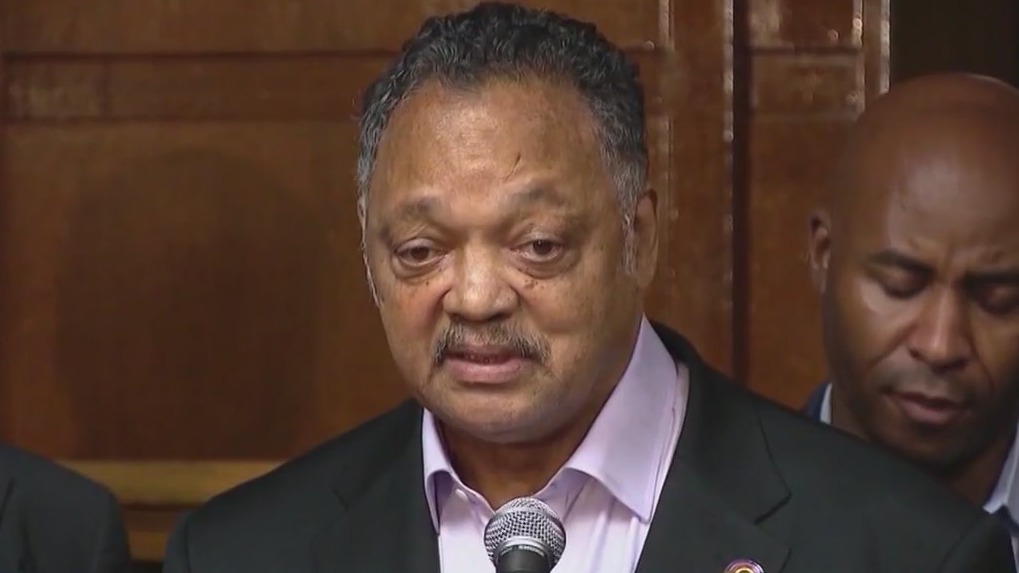
Jesse Jackson to step down as head of civil rights organization Rainbow PUSH
The Rev. Jesse Jackson plans to step down from leading the Chicago civil rights organization Rainbow PUSH Coalition he founded in 1971, his sons congressional office said Friday.
CHICAGO - After nearly six decades of dedicated service to civil rights activism, Rev. Jesse Jackson has announced his decision to step down as the president of the Rainbow PUSH Coalition.
Jackson, who will turn 82 in October, made the announcement during the organization's weekly broadcast on Saturday.
"I want to talk about the coalition a little bit because we had a board meeting last week. I’m going to make a transition pretty soon. I’ve been doing this stuff for 64 years. I was 18-years-old. I'm going to get a new president for Rainbow PUSH Coalition," Jackson said during the broadcast.
"I'm going to work along with the new president and our board, and we'll have a new president who will in fact be working here day to day. I want to see us grow and prosper. I think this idea about stopping your drop does not make sense. We have the ability to build on what we've established over the years."
SUBSCRIBE TO FOX 32 ON YOUTUBE
The news of Jackson's resignation comes as the Rainbow PUSH Coalition prepares to host their annual international convention at the University of Chicago’s David Rubinstein Forum this weekend. Jackson said the new president will address the convention.
Vice President Kamala Harris is set to visit Chicago in the coming days and weeks. Harris will be a special guest speaker on Sunday at the Rainbow PUSH Coalition's annual convention.
U.S. Rep. Jonathan Jackson, an Illinois Democrat, said his father "has forever been on the scene of justice and has never stopped fighting for civil rights" and that will be "his mark upon history."
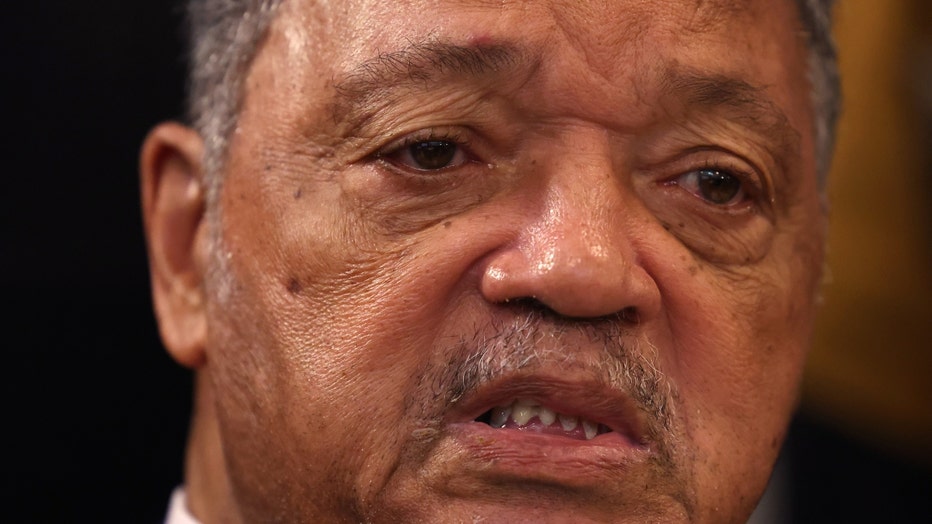
Rev. Jesse Jackson announces his support for Chicago mayoral candidate Brandon Johnson during an event at the Rainbow/PUSH Coalition headquarters on March 17, 2023 in Chicago, Illinois. (Scott Olson/Getty Images)
Father Michael Pfleger at St. Sabina Church has known Jackson since he was in his 20's and has been an inspiration ever since. Pfleger says one key piece of Jackson's legacy is keeping a glass half-full attitude.
"Dr. King would challenge all the inequalities and in justices, the racism and all the stuff that was gone, he would name it out front. But he always ended with a message of hope. And I think Rev. Jackson has done that, you know, you go anywhere in this country, and say keep hope alive. They know as Jesse Jackson."
Chicago Mayor Brandon Johnson called Jackson "an architect of the soul of Chicago" in a statement Friday.
"Through decades of service, he has led the Rainbow PUSH Coalition at the forefront of the struggle for civil rights and social justice. His faith, his perseverance, his love, and his relentless dedication to people inspire all of us to keep pushing for a better tomorrow," said Johnson, who was endorsed by Jackson when he ran for mayor earlier this year.
Al Sharpton, president and founder of the National Action Network, said in a statement that he had spoken to Jackson on Friday morning and "told him that we will continue to glean from him and learn from him and duplicate him in whatever our organizations and media platforms are. Because he has been an anchor for me and many others."
Sharpton called Jackson his mentor, adding: "The resignation of Rev. Jesse Jackson is the pivoting of one of the most productive, prophetic, and dominant figures in the struggle for social justice in American history."
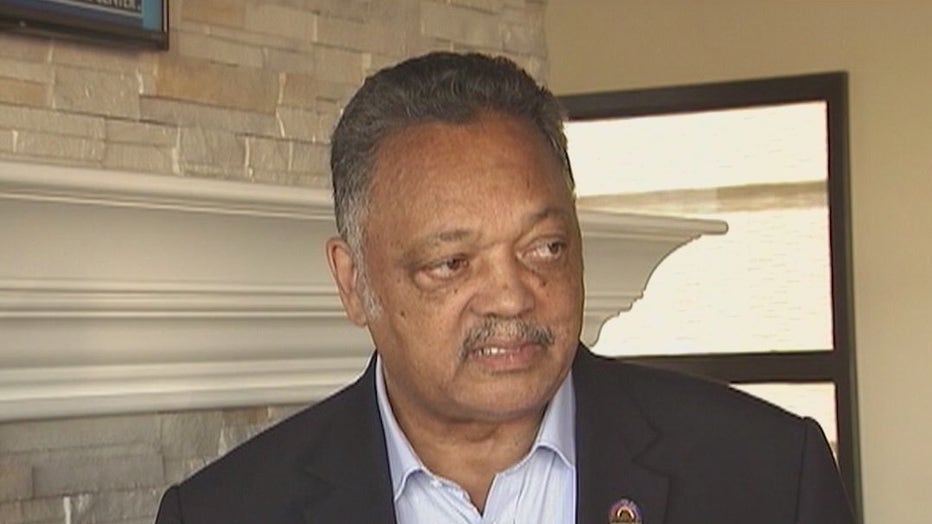
Rev. Jesse Jackson
Jackson has remained active in civil rights in recent years despite health setbacks.
He announced in 2017 that he had begun outpatient care for Parkinson's disease two years earlier. In early 2021, he had gallbladder surgery and later that year was treated for COVID-19 including a stint at a physical therapy-focused facility. He was hospitalized again in November 2021 for a fall that caused a head injury.
Jackson, a protégé of the Rev. Martin Luther King, broke with the Southern Christian Leadership Conference in 1971 to form Operation PUSH - originally named People United to Save Humanity - a sweeping civil rights organization based on Chicago's South Side.
The organization was later renamed the Rainbow PUSH Coalition with a mission ranging from encouraging corporations to hire more minorities to voter registration drives in communities of color. Its annual convention is set for this weekend in Chicago.
Jackson has long been a powerful voice in American politics.
Until Barack Obama's election in 2008, Jackson was the most successful Black candidate for the U.S. presidency, winning 13 primaries and caucuses for the Democratic nomination in 1988.
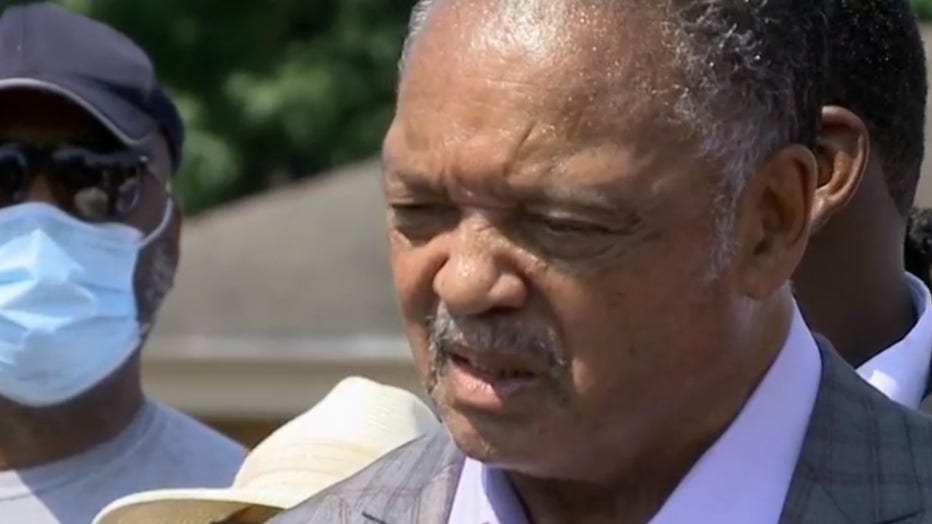
Jackson has helped guide the modern civil rights movement on a wide variety of issues, including voting rights and education.
He stood with the family of George Floyd at a memorial for the Black man murdered in 2020 by a white police officer, whose death forced a national reckoning with police brutality and racism. Jackson also participated in COVID-19 vaccination drives to battle hesitancy in Black communities.
Jackson has taken on numerous roles that have shaped his life. Here are some of them:
CIVIL RIGHTS PIONEER
Jackson’s passion for civil rights was deep in his DNA from his earliest days.
He was arrested in 1960 in his native South Carolina when he and others entered a segregated public library.
Five years later, Jackson joined King in the Selma to Montgomery, Alabama, marches. His world changed with terrible suddenness on the night of April 4, 1968, when King died of an assassin’s bullets on a balcony of the Lorraine Motel in Memphis. Jackson was with him.
As the towering leader at the center of the civil rights movement, King had been a dominant presence in the life of the young activist, still in his 20s. In the years that followed, Jackson would come into his own, becoming a familiar public face and powerful orator, fighting for voting rights, equal job and business opportunities for African-Americans and an end to other racial injustices.
"In many ways, history is marked as ‘before’ and ‘after’ Rosa Parks," Jackson said after the death of the woman whose refusal to give up her seat on a bus helped invigorate the civil rights movement. "She sat down in order that we all might stand up, and the walls of segregation came down."
Jackson has continued to emphasize the power of the vote in recent appearances.
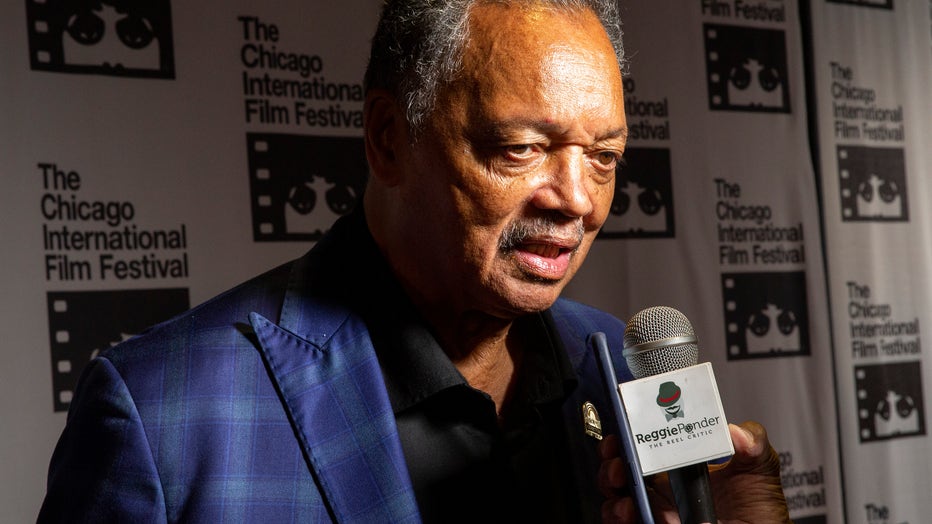
Rev. Jesse Jackson on the red carpet for "Punch 9 For Harld Washington" during the 57th Chicago International Film Festival at the AMC River East Theater on October 14, 2021 in Chicago, Illinois. (Photo by Barry Brecheisen/Getty Images)
ACTIVIST
In 2014, Jackson quietly and without fanfare walked up to a memorial on a street in Ferguson, Missouri, where black 18-year-old Michael Brown was shot to death by a white city police officer. He was greeted warmly by people living nearby and those viewing the memorial.
Jackson also joined protesters as they marched through the streets of the St. Louis suburb, demanding justice on Brown’s behalf and a stop to unfair treatment of blacks by the Ferguson officers.
It was one of countless demonstrations Jackson has participated in over the decades — marching against apartheid; flashing the peace sign at an anti-Iraq war rally in London; joining striking Red Cross, grocery and airline workers on picket lines in cities across the nation; getting arrested for protesting at a plant where workers’ jobs were being relocated to China.
Like King and other civil rights leaders, Jackson has maintained the belief that change can be achieved through nonviolence.
He led a protest last year in Flint, Michigan, where a lead-tainted water crisis started when a state-appointed manager in 2014 switched the city’s service to the Flint River from Detroit’s system. The river water was not properly treated, causing lead to leach from aging pipes into Flint homes. Tests later showed high lead levels in some children.
Jackson said there should be "tape around the city, because Flint is a crime scene."
CANDIDATE
In 1984, Jackson entered the presidential arena as an improbable candidate for the Democratic nomination, a black civil rights activist who thundered against racial injustice and poverty, never sugarcoating his words as he addressed an overwhelmingly white electorate.
Jackson, who’d never run for public office, mobilized surprisingly large support with the passion of his words, an experienced minister who made the campaign trail itself his pulpit. He called his base a "rainbow coalition" as he won the backing of progressives, blacks, Hispanics, blue-collar workers and struggling farmers.
Taking aim at poverty and racism, Jackson called for increased federal funding for social programs, cutting the defense budget and reversing President Ronald Reagan-era tax cuts. He also called for creation of a Palestinian state — something that chilled his relationship with some Jewish voters.
Despite the skepticism that greeted his bid, Jackson won more than 3 million votes. Though he came in a distant third, Jackson was credited with enrolling as many as 2 million Democratic voters that some say helped the party recapture the Senate in 1986.
In a riveting convention speech, Jackson summed up his historic — and imperfect — campaign.
"I am not a perfect servant," he said. "I am a public servant doing my best against the odds. As I develop and serve, be patient. God is not finished with me yet."
Four years later, Jackson made another bid for the White House, this time more experienced and better funded. His message remained the same. America had much work to do to overturn the racial discrimination, poverty and injustice that had long haunted it.
In that campaign, he won nearly 7 million votes.
NEGOTIATOR
For Jackson, the world has been his stage. In his role as a self-styled diplomat, he’s met with leaders such as Cuba’s Fidel Castro and Iraq’s Saddam Hussein, brokered the release of American prisoners and lobbied for causes such as wiping out apartheid.
His first success came in 1984 when Jackson, then running for president, negotiated the release from Syria of Navy Lt. Robert Goodman, who was shot down over Lebanon. That same year, Jackson visited Castro, who then freed dozens of American and Cuban prisoners from Cuban jails. In 1990, Jackson helped secure the release from Iraq of hundreds of foreign women and children being detailed as human shields to ward off an American military attack after Iraq’s invasion of Kuwait.
Critics sometimes accused Jackson of showboating and meddling in foreign policy, but his diplomatic forays also won him praise. After Goodman’s release, Reagan, in a White House ceremony, called Jackson’s trip to Syria "a personal mission of mercy" worthy of admiration.
Jackson once explained his foreign policy strategy: "Humanitarian appeals always help. They penetrate deeper than political trade-offs."
And at a ceremony in Chicago to mark the 30th anniversary of Goodman’s release, Jackson summed up his negotiating skills with a simple declaration:
"Talking matters. No talking never works."
FAMILY MAN
Jackson’s personal life has had its share of joy and pain. He met his wife, Jacqueline, at North Carolina Agricultural & Technical College as the civil rights movement began gaining momentum. They soon were married and had five children — three sons and two daughters.
Unlike her husband, Jacqueline Jackson has largely avoided the spotlight. But in 2001, the glare from her husband’s affair with a former aide shone on Jacqueline Jackson. Her husband admitted that January to fathering a daughter with the former aide.
Then in 2013, Jesse Jackson watched as his son, former U.S. Rep. Jesse Jackson Jr., was sentenced to 2½ years in prison for illegally spending $750,000 in campaign funds on personal items. Jesse Jackson Jr.'s wife, Sandra Jackson, also was sentenced for filing false joint federal income tax returns.
In 2012, Jesse Jackson told The Associated Press: "My heart burns. As I always say to my children, champions have to play with pain. You can’t just walk off the field because you’re hurt."
Following his son’s sentencing, Jackson told reporters it had been "an extraordinarily difficult time for our family."
FIGHTER
After publicly disclosing his Parkinson’s disease in 2017, Jackson vowed to keep plugging away for the causes that have helped define him.
"I will continue to try to instill hope in the hopeless, expand our democracy to the disenfranchised and free innocent prisoners around the world," he wrote. "I steadfastly affirm that I would rather wear out than rust out."
The Associated Press contributed to this report.

